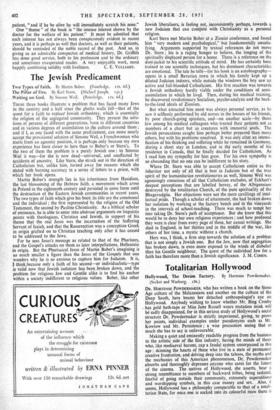The Jewish Predicament
THESE three books illustrate a problem that has faced many Jews in the century and a half since the ghetto, walls fell—that of the quest for a faith to replace' Jewish orthodoxy, which is essentially the religion of the segregated community. They present the solu- tions of persons of different generations, born in different countries and in various degrees of assimilation to the culture around them ; and if I, as one faced with the same predicament, can more nearly accept the provisional solution of Simone Weil, a Frenchwoman who starts from an agnostic position, it is perhaps only because my own experience has been closer to hers than to Buber's or Stern's. To the two of them the problem is a purely Jewish one ; to Simone Weil it was—for she is now dead—universal, and unaffected by accidents of ancestry. Like Stern, she struck out in the direction of Catholicism but, unlike him, turned away for reasons which she stated with burning accuracy in a series of letters to a priest, with which her book opens.
Martin Buber's strength lies in his inheritance from Hasidism, the last blossoming of the Hebrew faith, a movement which arose in Poland in the eighteenth century and persisted in some form until the destruction of the Eastern Jewish communities in recent years. The two types of faith which give his book its title are the communal and the individual ; the first represented by the religion of the Old Testament, the second by Pauline Christianity. As a biblical scholar of eminence, he is able to enter into abstruse arguments on linguistic points with theologians, Christian and Jewish, in support of his theme that the real Jesus was the incarnation of the Suffering Servant of Isaiah, and that the Resurrection was a conception Greek in _origin grafted on to Christian teaching only after it has ceased to be addressed to the Jews.
For he sees Jesus's message as related to that of the Pharisees, and the Gospel's attacks on them as later interpellations, Hellenistic in origin. But the Pharisaical Jesus of Martin Buber's imagining is so much smaller a figure than the Jesus- of the Gospels that one wonders why he is so anxious to capture him for Judaism.. It is, I. think,because only a faith of his second—or individualistic—type is valid now that Jewish isolation has been broken dawn, and the problem for religious Jew and Gentile alike is to find his anchor within a society indifferent to religious values. Buber, like other
Jewish liberalisers, is feeling out, inconsistently perhaps, towards a new Judaism that can compete with Christianity as a personal religion.
Karl Stern met Martin Buber at a Zionist conference, and found him "very modern and psychological," but fundamentally unsatis- fying. Arguments supported by textual references do not move Dr. Stern ; his is a raging hunger to believe, the longing of the spiritually displaced person for a home. There is a reference on the dust-jacket to his scientific attitude of mind. He has certainly been trained to use scientific techniques, but his dominant characteristics are emotional. The tale he tells—for his book is an autobiography— opens in a small Bavarian town in which his family kept up a diluted Judaism indoors, while outside the windows the boy saw an active and full-blooded Catholicism. His first reaction was towards a Jewish orthodoxy hardly viable under the conditions of semi- assimilation in which he lived. Then, during his medical training, he discovered revolutionary Socialism, psycho-analysis and the back- to-the-land ideals Of Zionism.
But what attracted him most was always personal service, as he saw it selflessly performed by old nurses in the houses of his friends, by poor church-going spinsters, and—on another scale—by those few among his medical colleagues who treated their patients not as numbers of a chart but as creatures with immortal souls. The Jewish persecutions caught him perhaps better prepared than many others, but with his problems unsolved. It was only after an intensi- fication of his thinking and suffering while he remained in Germany, during a short stay in London, and in the early months of his residence in Canada, that he finally decided for Catholicism. As I read him my sympathy for him grew. For his own sympathy is so abounding that no one can be indifferent to his story.
Where Dr. Stern was able to accept Catholicism entire as the inheritor not only of all that is best in Judaism but of the true spirit of the humanitarian revolutionaries as well, Simone Well was agonisingly conscious of all that Catholicism excludes, of Eckhart's deepest perceptions that are labelled heresy, of the Albigensians destroyed by the totalitarian Church, of the pure spirituality of the Bhagavadgita. Her objections were not the mere cavillings of intel- lectual pride. Though a scholar of attainment, she had broken down her isolation by working at the factory bend' and in the vineyards in the intervals of school-teaching. There was much to tempt her into taking Dr. Stern's path of acceptance. But she knew that this would be to deny her own religious experiences ; and how profound they were is clear from every page of these, her casual writings. She died in England, in her thirties and in the middle of the war, like others of her time, a mystic without a church.
Hers was, I think, a firm step towards the solution of a problem that is not simply a Jewish-one. But the Jew, now that segregation has broken down, is even thore exposed to the winds of disbelief than his Gentile neighbour. The quest of the individual Jew for a faith has therefore more than a Jewish significance. J. M. COHEN.


































 Previous page
Previous page